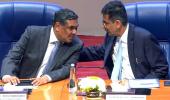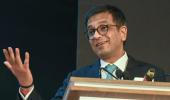Justice Sanjiv Khanna on Monday took oath as the 51st Chief Justice of India with Prime Minister Narendra Modi and other prominent persons wishing him well.

President Droupadi Murmu administered the oath of office to him at a brief swearing-in ceremony held at the Rashtrapati Bhavan.
The CJI took the oath in English in the name of god.
Justice Khanna, who was born on May 14, 1960, would have a tenure of a little over six months and demit office on May 13, 2025, at the age of 65 years.
He succeeded former CJI DY Chandrachud, who demitted office on November 10.
"Attended the oath-taking ceremony of Justice Sanjiv Khanna, who has been sworn in as the Chief Justice of the Supreme Court of India. My best wishes for his tenure,” PM Modi posted on X.
Congress president Mallikarjun Kharge also extended his wishes to CJI Khanna and noted the position would entail a great burden on his shoulders owing to extensive scrutiny and expectations.
In a post on X, the Congress chief said, "Extending best wishes to Justice Sanjiv Khanna for taking oath as the 51st Chief Justice of India. The position of the chief justice of India would undoubtedly place a lot of weight on his shoulders due to the extensive scrutiny and expectations that the office brings with it."
Kharge added, "I am sure with his long and distinguished experience, he will be able to bear the weight of this responsibility and serve the judiciary with distinction."
Apart from the PM and former CJI Chandrachud, Vice-President Jagdeep Dhankhar, Defence Minister Rajnath Singh, Union Law Minister Arjun Ram Meghwal and former CJI J S Khehar were among the notable faces in attendance.
Justice Khanna, who commenced courtroom proceedings in the apex court this afternoon as the CJI, thanked lawyers for wishing him well.
"Thank you," said CJI Khanna, who was present on the bench along with Justice Sanjay Kumar.
"I wish you a fruitful tenure as the CJI," said senior advocate and former Attorney General Mukul Rohatgi at the outset of the proceedings.
Other lawyers too wished him well.
CJI Khanna, who has served as a Supreme Court judge since January 2019, was a part of several landmark judgments such as upholding the sanctity of EVMs, scrapping of the electoral bonds scheme, upholding the abrogation of Article 370 and grant of interim bail to former Delhi CM Arvind Kejriwal.
He belongs to an illustrious Delhi-based family and is the son of former Delhi High Court judge Justice Dev Raj Khanna and the nephew of prominent former apex court judge H R Khanna.
The CJI, who was elevated in the Supreme Court on January 18, 2019, was third-generation legal professional who initially practiced as a lawyer before being appointed as a judge of the Delhi high court. He is believed to be driven by the zeal to reduce pendency and speed up justice delivery.
His uncle Justice HR Khanna, known for his dissent in the infamous ADM Jabalpur case, was a part of the landmark verdict propounding the basic structure doctrine in the Kesavananda Bharati case in 1973.
Justice HR Khanna resigned in 1976 upon rendering the ADM Jabalpur judgment after he was superseded by Justice M H Beg, appointed as the CJI by the government.
Justice Khanna, on the other hand, has been a part of significant rulings, including the verdict that upheld the use of electronic voting machines in elections, outlining the devices to be secure.
A bench he led on April 26, termed the suspicion of the manipulation of EVMs "unfounded" while rejecting the demand to revert to the previous paper ballot system.
He was also part of the five-judge bench that declared the electoral bond scheme, meant for funding political parties, as unconstitutional.
Another five-judge constitutional bench he was a part of upheld the Centre's 2019 decision of abrogation of Article 370 of the Constitution that granted a special status to Jammu and Kashmir.
It was the Justice Khanna's bench, which granted interim bail to former Delhi chief minister Kejriwal for the first time in the excise policy scam cases to campaign in the Lok Sabha election.
He obtained his law degree from the Campus Law Centre of Delhi University following which he enrolled as an advocate with the Bar Council of Delhi in 1983 and practised in Tis Hazari courts and the Delhi High Court, where he argued in a number of criminal cases as an additional public prosecutor and amicus curiae.
He had a long tenure as the senior standing counsel for the Income Tax Department.
In 2004, he was appointed as the standing counsel (civil) for the National Capital Territory of Delhi.
During his judgeship, CJI Khanna served as the executive chairman of the National Legal Service Authorityrs.











 © 2025
© 2025